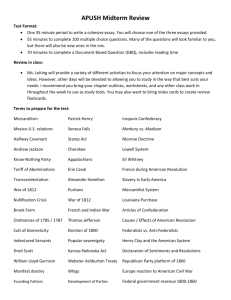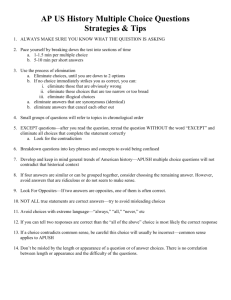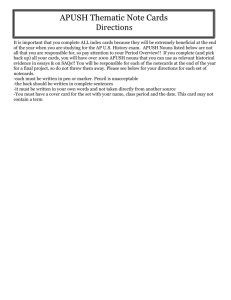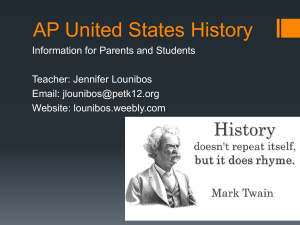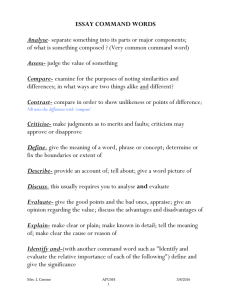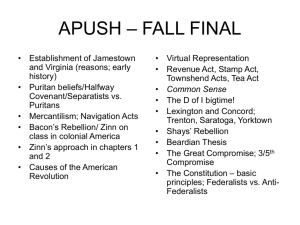AP US Syllabus - Solon City Schools
advertisement
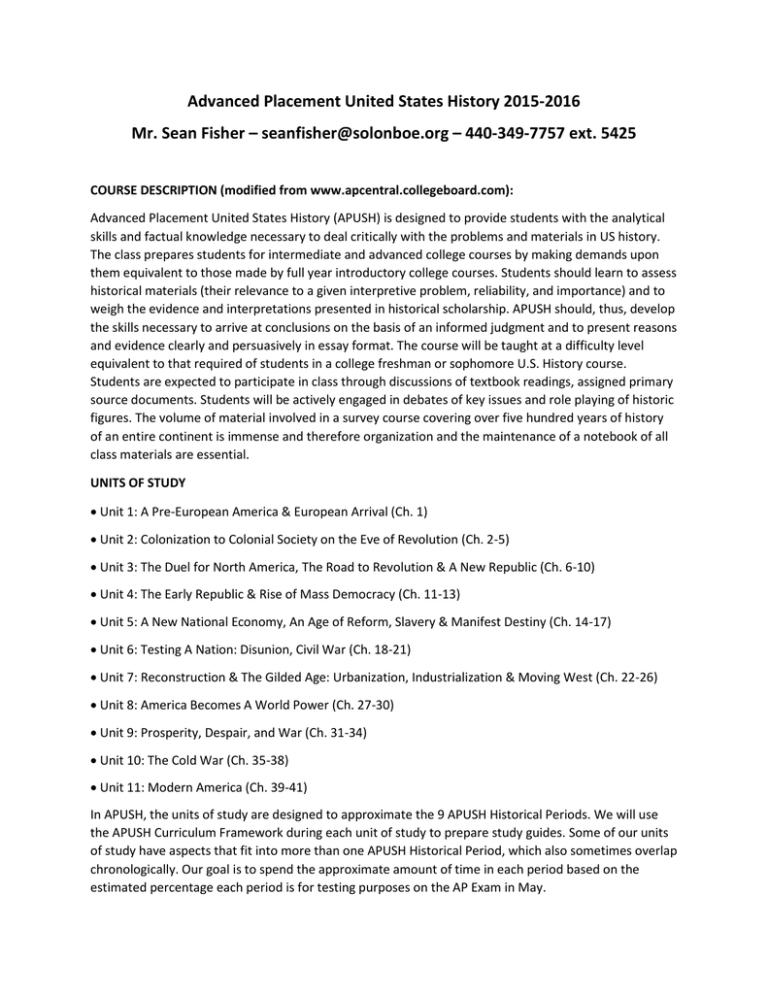
Advanced Placement United States History 2015-2016 Mr. Sean Fisher – seanfisher@solonboe.org – 440-349-7757 ext. 5425 COURSE DESCRIPTION (modified from www.apcentral.collegeboard.com): Advanced Placement United States History (APUSH) is designed to provide students with the analytical skills and factual knowledge necessary to deal critically with the problems and materials in US history. The class prepares students for intermediate and advanced college courses by making demands upon them equivalent to those made by full year introductory college courses. Students should learn to assess historical materials (their relevance to a given interpretive problem, reliability, and importance) and to weigh the evidence and interpretations presented in historical scholarship. APUSH should, thus, develop the skills necessary to arrive at conclusions on the basis of an informed judgment and to present reasons and evidence clearly and persuasively in essay format. The course will be taught at a difficulty level equivalent to that required of students in a college freshman or sophomore U.S. History course. Students are expected to participate in class through discussions of textbook readings, assigned primary source documents. Students will be actively engaged in debates of key issues and role playing of historic figures. The volume of material involved in a survey course covering over five hundred years of history of an entire continent is immense and therefore organization and the maintenance of a notebook of all class materials are essential. UNITS OF STUDY Unit 1: A Pre-European America & European Arrival (Ch. 1) Unit 2: Colonization to Colonial Society on the Eve of Revolution (Ch. 2-5) Unit 3: The Duel for North America, The Road to Revolution & A New Republic (Ch. 6-10) Unit 4: The Early Republic & Rise of Mass Democracy (Ch. 11-13) Unit 5: A New National Economy, An Age of Reform, Slavery & Manifest Destiny (Ch. 14-17) Unit 6: Testing A Nation: Disunion, Civil War (Ch. 18-21) Unit 7: Reconstruction & The Gilded Age: Urbanization, Industrialization & Moving West (Ch. 22-26) Unit 8: America Becomes A World Power (Ch. 27-30) Unit 9: Prosperity, Despair, and War (Ch. 31-34) Unit 10: The Cold War (Ch. 35-38) Unit 11: Modern America (Ch. 39-41) In APUSH, the units of study are designed to approximate the 9 APUSH Historical Periods. We will use the APUSH Curriculum Framework during each unit of study to prepare study guides. Some of our units of study have aspects that fit into more than one APUSH Historical Period, which also sometimes overlap chronologically. Our goal is to spend the approximate amount of time in each period based on the estimated percentage each period is for testing purposes on the AP Exam in May. THE AP EXAM – REQUIRED AS PART OF THIS COURSE (from www.apcentral.collegeboard.com) The AP exam is 3 hours and 15 minutes long and includes both a 100 minute multiple choice/short answer section and a 95 minute free-response section. Section 1 55 Multiple Choice Questions in 55 Minutes 4 Short Answer Questions (SAQ) in 45 Minutes 40% of Exam Score 20% of Exam Score Section 2 1 Document-Based Question (DBQ) in 60 Minutes 25% of Exam Score 1 Long Essay (LEQ), chosen from pair, in 35 Minutes 15% of Exam Score Student performance on these four parts will be compiled and weighted to determine an AP exam score. Assessments in this course will be designed to reflect the testing format utilized on the AP Exam. Scoring 5 – Extremely Well Qualified 4 – Well Qualified 3 – Qualified 2 – Possibly Qualified 1 – No Recommendation ** If you score 3 or higher, you will get college credit for this course at any Ohio public university REQUIRED TEXTS & MATERIALS Textbook - Kennedy, David M.; Cohen, Lizabeth. The American Pageant. 16th ed. - Information on the companion textbook website will be provided in class Various other primary and secondary sources to be determined. A binder with tabs for each unit of study Blue and black pens and No. 2 pencils CURRICULUM FRAMEWORK HISTORICAL THINKING SKILLS: AP US History is designed to develop a student’s thinking and writing skills through the study of U.S. History. The skills on which we will focus are: Analyzing Historical Evidence & Sources Making Historical Connections Chronological Reasoning Historical Argumentation THEMATIC LEARNING OBJECTIVES: A. B. C. D. E. F. G. Identity – formation of American national identity and group identities within U.S. Work, exchange and technology – development of American economy Peopling – movement of people and adaptations they made Politics and Power America in the World Environmental Geography – physical and human Ideas, Beliefs and Culture ASSESSMENT & ACADEMIC INTEGRITY Grades follow the high school grading scale (90 =A, 80=B, 70=C, 60=D, 59.9% = F) assessment of how you are learning takes place on a regular basis in the classroom. Grades round automatically, don’t ask me to add points at end of quarter. Grading is weighted in this course: Tests/Quizzes = 85%, In class work/homework = 15% Each quarter assignments will vary and may include the following: Unit tests consisting of multiple choice and/or short answer questions (SAQs), long essay questions (LAQs) given randomly, document based questions (DBQs) given randomly, debates, investigative projects, cooperative work, multimedia projects, and participation Academic Integrity: Cheating enables a student to acquire an unfair advantage over others. Cheating includes, but is not limited to: Receiving help when it is not allowed, Allowing someone to copy your work Copying the work of others with or without their permission Hand gestures, written notes and/or noises to communicate the answers Plagiarism consists of copying someone else’s work, with or without his/her consent. Any form of plagiarism yields an automatic referral to the administration. Cheating and plagiarism are unacceptable and will result in a score of 0 on that assignment, communication with a parent/guardian, plus a referral for further action by the high school administration. A second offense, in any course, will result in a failure for that quarter in that course. Late Work: Work can be turned in one day late for ½ credit on most assignments. After one day, no credit will be given. Making Up Work if Absent: One day for each day absent for each day of excused absence only. It is the responsibility of the student to approach me for any make-up work. CLASS GUIDELINES A. Follow all school rules. Read your handbook if in doubt. B. Go to the restroom before class begins. I would rather you be 30 seconds late to class than ask me to go once class starts. There is no such thing as a hall pass anymore. C. If you need to sharpen a pencil, blow your nose, etc… - just do it. D. No sleeping in class unless I do. E. Respect everyone and their opinions. F. Food & drink should be kept to a minimum and should never become a distraction. If it creates any kind of mess requiring me to clean up after you, this privilege will be eliminated. KEYS TO SUCCESS 1. 2. 3. 4. 5. 6. Time management Can you write & think critically? Ability to argue a position – become a young lawyer Need to learn history as you would in normal class, but at very accelerated pace Have to learn how to write in a historical way I am always available for help, just ask. My job is to help you be successful, but you need to do your part by asking for help when needed. 7. You must read – you are expected to come to class prepared to discuss ideas, ask questions for clarification, etc…
